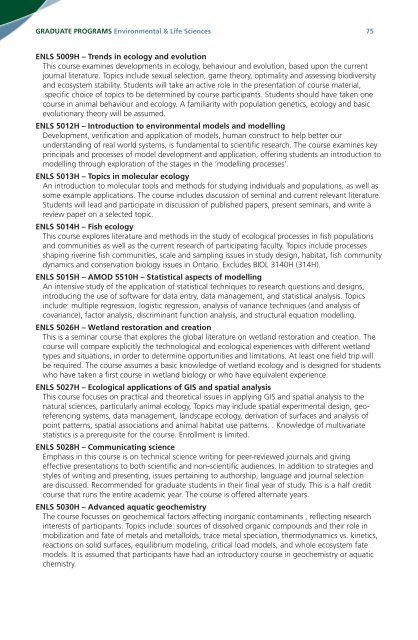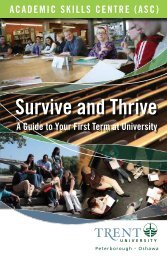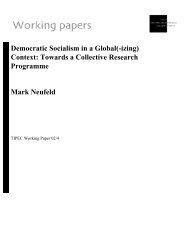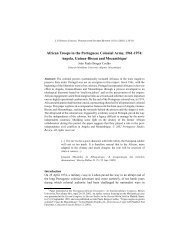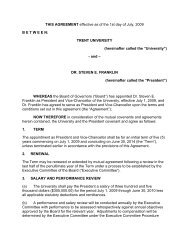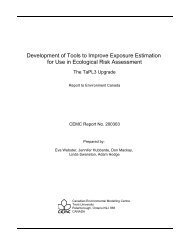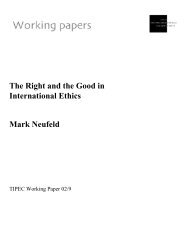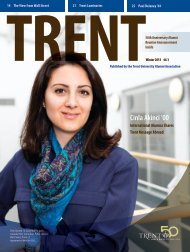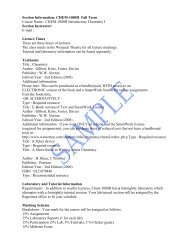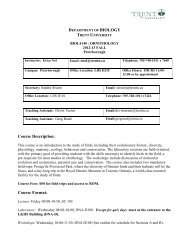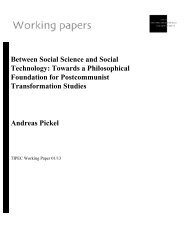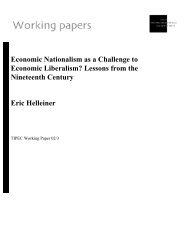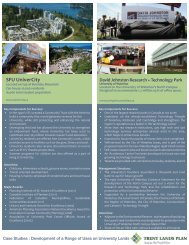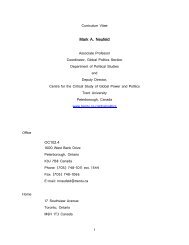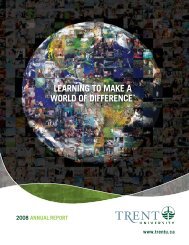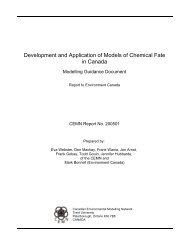Graduate academic calendar 2012 - 2013 - Trent University
Graduate academic calendar 2012 - 2013 - Trent University
Graduate academic calendar 2012 - 2013 - Trent University
You also want an ePaper? Increase the reach of your titles
YUMPU automatically turns print PDFs into web optimized ePapers that Google loves.
GRADUATE PROGRAMS Environmental & Life Sciences<br />
75<br />
ENLS 5009H – Trends in ecology and evolution<br />
This course examines developments in ecology, behaviour and evolution, based upon the current<br />
journal literature. Topics include sexual selection, game theory, optimality and assessing biodiversity<br />
and ecosystem stability. Students will take an active role in the presentation of course material,<br />
.specific choice of topics to be determined by course participants. Students should have taken one<br />
course in animal behaviour and ecology. A familiarity with population genetics, ecology and basic<br />
evolutionary theory will be assumed.<br />
ENLS 5012H – Introduction to environmental models and modelling<br />
Development, verification and application of models, human construct to help better our<br />
understanding of real world systems, is fundamental to scientific research. The course examines key<br />
principals and processes of model development and application, offering students an introduction to<br />
modelling through exploration of the stages in the ‘modelling processes’.<br />
ENLS 5013H – Topics in molecular ecology<br />
An introduction to molecular tools and methods for studying individuals and populations, as well as<br />
some example applications. The course includes discussion of seminal and current relevant literature.<br />
Students will lead and participate in discussion of published papers, present seminars, and write a<br />
review paper on a selected topic.<br />
ENLS 5014H – Fish ecology<br />
This course explores literature and methods in the study of ecological processes in fish populations<br />
and communities as well as the current research of participating faculty. Topics include processes<br />
shaping riverine fish communities, scale and sampling issues in study design, habitat, fish community<br />
dynamics and conservation biology issues in Ontario. Excludes BIOL 3140H (314H).<br />
ENLS 5015H – AMOD 5510H – Statistical aspects of modelling<br />
An intensive study of the application of statistical techniques to research questions and designs,<br />
introducing the use of software for data entry, data management, and statistical analysis. Topics<br />
include: multiple regression, logistic regression, analysis of variance techniques (and analysis of<br />
covariance), factor analysis, discriminant function analysis, and structural equation modelling.<br />
ENLS 5026H – Wetland restoration and creation<br />
This is a seminar course that explores the global literature on wetland restoration and creation. The<br />
course will compare explicitly the technological and ecological experiences with different wetland<br />
types and situations, in order to determine opportunities and limitations. At least one field trip will<br />
be required. The course assumes a basic knowledge of wetland ecology and is designed for students<br />
who have taken a first course in wetland biology or who have equivalent experience.<br />
ENLS 5027H – Ecological applications of GIS and spatial analysis<br />
This course focuses on practical and theoretical issues in applying GIS and spatial analysis to the<br />
natural sciences, particularly animal ecology, Topics may include spatial experimental design, georeferencing<br />
systems, data management, landscape ecology, derivation of surfaces and analysis of<br />
point patterns, spatial associations and animal habitat use patterns. . Knowledge of multivariate<br />
statistics is a prerequisite for the course. Enrollment is limited.<br />
ENLS 5028H – Communicating science<br />
Emphasis in this course is on technical science writing for peer-reviewed journals and giving<br />
effective presentations to both scientific and non-scientific audiences. In addition to strategies and<br />
styles of writing and presenting, issues pertaining to authorship, language and journal selection<br />
are discussed. Recommended for graduate students in their final year of study. This is a half credit<br />
course that runs the entire <strong>academic</strong> year. The course is offered alternate years.<br />
ENLS 5030H – Advanced aquatic geochemistry<br />
The course focusses on geochemical factors affecting inorganic contaminants , reflecting research<br />
interests of participants. Topics include: sources of dissolved organic compounds and their role in<br />
mobilization and fate of metals and metalloids, trace metal speciation, thermodynamics vs. kinetics,<br />
reactions on solid surfaces, equilibrium modeling, critical load models, and whole ecosystem fate<br />
models. It is assumed that participants have had an introductory course in geochemistry or aquatic<br />
chemistry.


